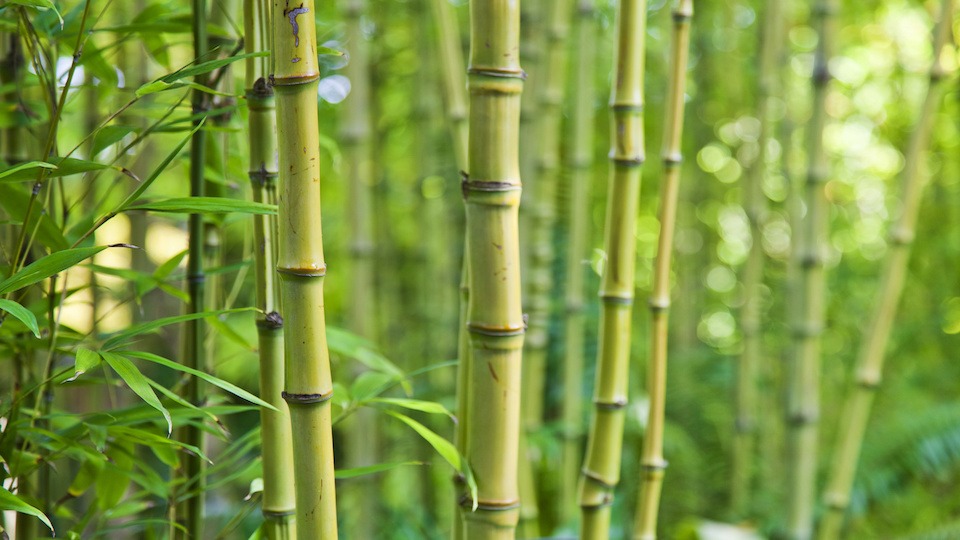Panda bears have it easy. They never need to worry about the latest diet craze. They never get confused about what to eat. The reason is that pandas eat bamboo. That’s it. Bamboo makes up 99% of the panda bear diet! Besides being the staple food for panda bears, bamboo is a fantastic plant that with a remarkable social, industrial, nutritional, and medicinal history. This article by my team at UpWellness is full of fascinating facts about this most functional plant. Enjoy.
-JL
You have likely seen stands of bamboo growing along the edge of a field or even in a home garden. Although it is considered an invasive species by many, there is no doubt that this favorite treat of the pandas and a highly practical renewable resource, is useful on so many levels from framing houses to building collagen.
The Chinese consumed bamboo during the Ming Dynasty, and it was even referenced in a note from the even earlier Tang Dynasty citing bamboo as one of the most useful plants on the planet.
Bamboo is a flexible wonder with many uses
There are over 1,500 species of bamboo, the tallest member of the grass family. Characterized by strong, but flexible upright habit, bamboo grows extremely fast, up to 25 feet in 25 days and spreads vertically as well as horizontally at alarming rates. The flexible plant is so strong that it merely bends with the weight of heavy and wet snow, springing back unharmed once the snow melts in the spring.
The amazing properties of bamboo make it perfect for the creation of products – everything from nutraceuticals to flooring, plywood, and even bedding. Bamboo is so popular in American that we have now surpassed China and Japan as having the most bamboo plants.
Bamboo’s medicinal properties
Asian medicinals first mention the use of bamboo as medicine in the 6th century, and modern analysis of the plant shows that it contains 88.8% moisture, 3.9% protein, 0.5% fat, 11% minerals, and 5.7% carbohydrates per 100 grams of edible portion. In addition, it also contains calcium, phosphorus, iron, thiamine, riboflavin, niacin, and vitamin C… a pretty impressive lineup.
Bamboo leaves are rich in silica
The leaves of bamboo grass make a delicious and earthy tea that can be mixed with other herbal teas such as jasmine and mint to make creative and tasty blends. Steep one teaspoon of bamboo leaves in a cup of hot water for 5-10 minutes and add some monk fruit, stevia, or honey and lemon to boost the flavor of this very delicate tea.
Bamboo leaves contain 70% silica, which strengthens hair, skin, and nails. Silica also prevents the absorption of aluminum in the digestive system, which may be linked to Alzheimer’s and other conditions. It also plays a vital role in bone density and is a building block of collagen, which is necessary for healthy skin and joints.
Bamboo shoots are loaded with health-promoting properties
Bamboo shoots are harvested about two weeks after they pop up next to their parent bamboo plant, when they are about a foot tall. This staple in Asian countries takes a number of flavors. Canned or fresh, they are readily available in Asian markets and most grocery stores. A study from Punjab University in Chandigarh India reports that bamboo shoots are rich in protein, carbohydrates, fiber, and potassium while being low in fat and sugar.
Here are some more health-promoting properties of bamboo shoots
Cholesterol: Research demonstrates that the phytosterols and phytonutrients found in bamboo can reduce dangerous LDL cholesterol. A study from Washington State University showed that eating bamboo shoots has a favorable impact on cholesterol, lipids, and bowel function.
Immune system: The vitamins and minerals found in bamboo shoots including vitamin A, vitamin B6, vitamin E, thiam, nicin, riboflavin, calcium, magnesium, phosphorus, potassium, zinc, copper, iron, sodium, selenium and folate, help to strengthen the immune system
Anti-inflammatory: Bamboo shoots also contain anti-inflammatory, analgesic, and wound healing properties that have been found to help in the healing of external wounds and ulcers.
Anti-venomous: Ayurvedic medicine supports the use of bamboo extracts for anti-venomous properties that could be helpful for snake or scorpion bites.
Blood pressure: Bamboo shoots contain a great deal of potassium, which is useful in regulating blood pressure.
And even more reasons to consume leaves and shoots
Bamboo leaves and shoots are also important for male fertility, influencing thyroid hormones, balancing blood sugar, and as a powerful antioxidant for fighting against cellular damage.
Note: Always source organic bamboo leaves and shoots when possible and never replace existing medication with a supplement such as bamboo before speaking to a health practitioner.
-The UpWellness Team









